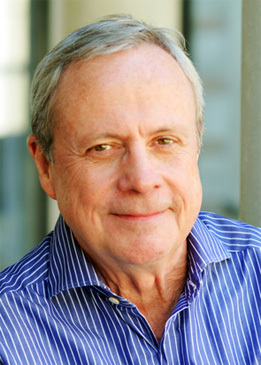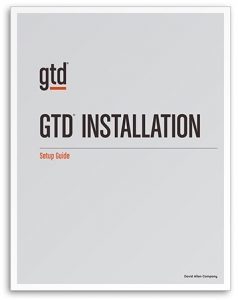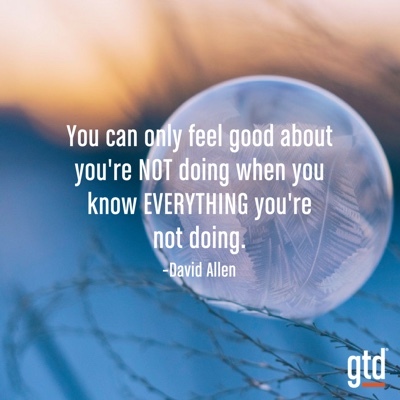David Allen's Blog, page 47
April 5, 2017
Making Use of Weird Windows of Time
 The concept of daily or weekly to-do lists is as outdated as rotary phones. We need to have a total, holographic view of everything we want to accomplish, and all the actions required to start any of them. And we need to have access to views of those actions whenever we actually might be able to do them.
The concept of daily or weekly to-do lists is as outdated as rotary phones. We need to have a total, holographic view of everything we want to accomplish, and all the actions required to start any of them. And we need to have access to views of those actions whenever we actually might be able to do them.
Most everyone I come across in my clients’ organizations are up to their eyeballs in work, and feel overwhelmed. Strategy and triage are indeed required to address that, but at least as important is the requirement for people to set up their lives to get a lot more efficient about getting a lot more done in a day.
To steal from a Motorola strategy from many years ago, we need to “mine the bandwidth.” They developed technology utilizing the more discreet areas “between the lines” in the radio frequencies already in place. Similarly we need to be ready for, and take advantage of, the weird uneven time and energy spaces we find ourselves in.
Ever have the attention span of a gnat…either externally imposed or internally generated (like 4:30 PM on a day of six meetings, five of which were brutal)? Ever have a short (but still unknown) time period, with informal distraction, like waiting for a late meeting to start?
There are very few times and places we really have the appropriate energy level, tools, and uninterrupted time frames to work on some of our “most important” work. The rest of the day, we shouldn’t be feeling guilty that we’re not working on “job one.” Rather, we should be maximizing our productivity by picking things to do (that we’re going to do anyway, sometime) that match the situation.
Catch up on the FYI-type Read-and-Review emails while waiting for meetings. Water your plants and fill your stapler when your brain is toast. Call to make the appointment you’ve been putting off when you have ten minutes before you board a plane. Problem is, most people don’t have all those options already figured out and put in appropriately accessible buckets to rummage through when those situations appear. And mostly when those weird time slots happen they don’t have the energy to remember them or figure them out.
It’s a subtle and fine line between doing less important items as a way to procrastinate, and doing them because it is the most productive thing you can do effectively. At worst it’s an energizing way to waste time semi-productively. At best, it’s keeping the decks clear and optimally utilizing yourself as a resource.
This essay appeared in David Allen’s Productive Living Newsletter. Subscribe for free here.
April 2, 2017
Episode #28: GTD and Mind Mapping
David Allen and Coach Kelly Forrister talk about using the creative technique of mind mapping for project brainstorming, meeting notes, checklists, gathering project data, and more.
Listen Now
Subscribe or Download
March 23, 2017
How well do you know the GTD Fundamentals?
How well do you know the GTD® Fundamentals? Designed for newbies getting their systems off the ground and veterans looking to close any gaps, the Level 1: Fundamentals course is offered around the world:
March 27 – Stockholm
March 29 – London
March 31 – Prague
March 31 – Milano
March 31 – Roma
March 31 – Torino
April 6 – Jyväskylä
April 12 – Los Angeles
April 15 – New Delhi
April 19 – København
April 25 – Oslo
April 26 – Minsk
April 27 – Hamburg
April 28 – Bratislava
May 1 – Sydney
Full schedule: http://gettingthingsdone.com/events/
March 20, 2017
March 14, 2017
Advice for perfectionists
Question: Do you have any GTD pointers for perfectionists? 
David Allen: Just focus on doing the next action perfectly, which is a lot easier than trying to be perfect about how you approach something bigger. Be as retentive as you want. The only problem is when it stops action. Be a perfectionist about the process, which will require, of course, making decisions on the front end that might not be perfect. Think about what might go wrong if you avoid decisions and action! (If you need a negative motivator.)
March 8, 2017
A Tense Muscle is a Slow One
A tense muscle is a slow one. This is a physiological and demonstrable fact in the martial arts. Could this be true in other aspects of our lives?
In karate, the power that can be generated by a punch is primarily due to speed, not muscle. It is the snap at the end of the whip. That is why petite people can learn to break boards and bricks with their hands—it’s not really about callouses, it’s more about the ability to generate that pop at the end of the thrust.
But a tense muscle is a slow one. So the high levels of training in the martial arts are about relaxation and balance, because that allows the flexibility and response-ability required to mobilize maximum resources at maximum speed for maximum results.
If I were sparring with you, I’d like nothing better than for you to be uptight and tense and over- or under-react to me. That’s called a “fake.” If that happens, I can control you. Your kids know that. So does a business adversary. People will unconsciously find your weak spots and use them to cause you to inappropriately respond and “lose.”
Not talking about six-beers-in-front-of-the-TV kind of relaxed. Rather, the most resourceful state of mind required when four people jump you in a dark alley, or you have to have That Serious Conversation with your son, or you have to fire someone.
To cleanly and clearly focus, 100%, with all your conscious and unconscious resources available for the task or expression at hand—that is the optimal “ready state.” It produces your ability to deal with surprise—elegantly, efficiently, and effectively. It will be your competitive edge. It is powerful.
This essay appeared in David Allen’s Productive Living Newsletter. Subscribe for free here.
March 2, 2017
Choosing a GTD system
Q: How should I choose which system to use (digital vs. paper) for GTD?
David Allen: Pay attention to your intuition, or just simply: What do you feel like using as a system? We’ve discovered people tend to resist the GTD® implementation process enough as it is, so you need all the help you can get to be motivated to work the system. If you know you’d like to be digital, don’t waste time on a paper system. But if you like the look and touch and feel of a cool notebook, go for it. No system works unless you work it.
February 25, 2017
Get help installing GTD
If you’re looking for a step-by-step manual for getting your GTD system up and running, our Installation Guide is a fantastic  resource. The guide includes:
resource. The guide includes:
Getting Started: Setting Up the Time, Space, and Tools
Collecting: Corralling Your “Stuff”
Processing: Getting “In” to Empty
Organizing: Setting Up the Right Buckets
Reflecting: Keeping Your System Functional
Doing: Making the Best Action Choices
Articles by David Allen
Frequently Asked Questions
Available in letter or A4 sizes
February 22, 2017
What does it mean to be organized?
 What does it mean to be organized? It used to be the definition was clean and neat. You know the offices–you walk in the door and it looks likes no one works there. The desk has nothing on it, except for a cool object and a photo. Is this what being organized really means?
What does it mean to be organized? It used to be the definition was clean and neat. You know the offices–you walk in the door and it looks likes no one works there. The desk has nothing on it, except for a cool object and a photo. Is this what being organized really means?
My answer is we need to update our definition of what the term organized means. We still think in terms of clean and neat. Most of us have some old unconscious wiring when it comes to thinking about organization. If you go digging, someone in there made it up that good, smart people are organized and the sloppy stupid people are disorganized. So we all want to be in the first group, but how do we get there?
Now I am really speaking from experience here because years ago I was searching for some answers. I only found the results I was after when I learned how to think in a new way, when I learned the Getting Things Done® methodology. Trust me, I have I tried it all.
Tell me if any of the thinking below rings a bell for you?
Myth: If we just get the files set up then we will be organized.
Reality: I tried this solution on more than one occasion myself, and I have seen people try this on as a solution on more than one continent. My personal and professional experience is that the beautiful color coded files don’t stay that way for long without a new way of thinking about reference materials.
Myth: There is just too much to do; let’s hire more administrative staff.
Reality: Great admin staff are worth their weight in gold, and all the support in the world will not manage your workflow. Personally I tried this solution on as well, the results were that I created more work for myself and still was stressed. I still felt like the Pig Pen character in the Peanuts cartoon.
Now don’t get me wrong. I am the biggest fan in the world of great administrative staff, and professional organizers are great when you need assistance with a special clean out project. None of the above though will assist you to think differently about your stuff or to learn to define what you want in your life and how to get there more elegantly.
So let’s redefine the conversation, shall we?
How your space looks says very little about your ability to get things done.
The real issue is not how your home or office looks, but how we all think about our workflow either at home or at work. This is the paradigm shift that is so radical, it is not about our outer environment, it is about our inner environment. The new conversation is about how we learn the methodology about the art of work. It is an educational process that takes time and energy to learn, just like learning any language.
Hopefully most of us would not wake up and judge ourselves for not speaking say Italian? (Pick any language here that you don’t speak. I personally would love to speak Italian.) Most of us accept that to learn a language you need time, dedication and energy. Learning the art of work for most of us is like learning a new language. Here is the good news: learning a language can be fun.
We also wouldn’t expect that if you know Italian you should be able to speak Chinese. Learning the art of work is distinct from having learned the skills to do your work. Most knowledge workers have spent years learning their profession, yet there is still the old thinking that they should instantly know the art of work. This is simply part of what I call Old think.
If you are looking for peace of mind, then learning how to think differently about your work is the key. Yes, the result is often a cleaner and more organized environment; this is only a nice byproduct of learning to think differently.
One day I hope that this conversation will not even be necessary. We are being frequently approached to teach the GTD® process from the grade school to the university level. The word is clearly spreading that there is a new way to think about yourself, your work and the art of work. So treat yourself to greater peace of mind, learn the GTD process, and relax and go have some fun.
–Marian Bateman, Certified Coach
February 21, 2017
Episode #27: GTD Keys to Clarifying
In this speech excerpt, David Allen shares the GTD® keys to clarifying your work.
Listen Now
Subscribe or Download
David Allen's Blog
- David Allen's profile
- 1484 followers




